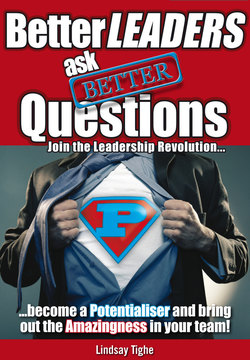Читать книгу Better Leaders Ask Better Questions - Lindsay Ph.D Tighe - Страница 19
На сайте Литреса книга снята с продажи.
The ego
ОглавлениеLet’s explore one other aspect of our preference to be more of a ‘teller’, and that is an aspect of human nature that most of us don’t like to talk about – the role of the ego. It will be helpful to demonstrate the role that our ego plays in typical, everyday leadership situations. So let’s go back to the scenario that we considered earlier, where your staff member comes to you for help with a work-related problem.
Remember that most of us are programmed to respond by telling or advising another person what to do, so automatically we provide an answer, or at the very least a suggestion, to the staff member. Now what I’d like you to think about is the impact our ‘telling’ has on us after we have helped our team member. Whilst most of what I am about to describe isn’t done at a conscious level, there is a good chance our ego will get a boost from our actions. We all have a need to feel significant and good about who we are, and in this instance we will be feeling a sense of self-satisfaction due to the fact that we have:
•helped the person out
•demonstrated our knowledge and wisdom
•proven that we are a good manager
•justified why we are the manager and they aren’t!
Whilst I accept that there is a little cynicism in these points, they aren’t too far from the truth if we are prepared to be honest. So, if this is the case then we need to recognise that if we change to being an ‘asker’ rather than a ‘teller’, this sense of self-satisfaction won’t occur because we are no longer providing an answer. Given that we are strongly motivated by doing things that make us feel good about ourselves, the possibility of changing a habit that enables us to give ourselves a pat on the back is not going to be easy to do. That said, I trust that sharing this awareness with you enables you to be prepared for letting go of this ‘ego fix’. I guarantee that your ego will feel very satisfied from the new practice I am going to share with you. Accordingly, at this stage please trust me that at the end of the day your ego will still be its normal, happy self, and maybe even more content than usual if you adopt this ‘asking’ approach.
Thus, understanding how you’d like to go about performing your role and the values that you will uphold is the starting point to being a better leader who asks Better Questions. Once you have that clear in your mind, you must have the strength of your convictions to go into the world and be that person, which will include managing the perceptions and expectations of others. This will undoubtedly bring challenges along the way, but I believe that a better leader will have the resilience and resolve to work their way through these problem areas and be strong through adversity. After all, wanting to tap into people’s potential, valuing empowerment and engaging your team are fabulous attributes of a true Potentialiser, attributes that most organisations are crying out for.
| CHAPTER SUMMARY |
| Typically we ‘tell’ because our staff and our manager expect us to. Being clear about our values and beliefs about how we want to fulfil our roles will enable us to manage expectations more easily. Our egos like the ‘telling’ approach because it gives us a sense of self-satisfaction, particularly if the ‘teller’ thinks they are being helpful. Letting go of the ‘telling’ approach may appear to be difficult at first because we might be restrained by our ego, but it will still be satisfied if we do more ‘asking’. |
